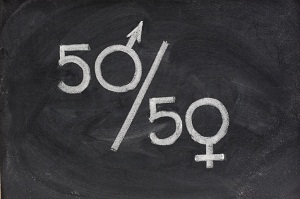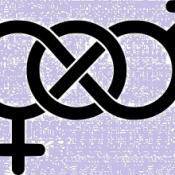 The state of Washington has been working for several years to change the language in its laws to gender-neutral terms. If legislation passes as expected, no longer will there be penmanship, freshmen, and watchmen. Instead, Washington will have handwriting, first-year students, and security guards.
The state of Washington has been working for several years to change the language in its laws to gender-neutral terms. If legislation passes as expected, no longer will there be penmanship, freshmen, and watchmen. Instead, Washington will have handwriting, first-year students, and security guards.
Several other states have followed suit, with about half making moves toward gender-neutral language. Such language is often lampooned as politically correct and excessively burdensome, but research shows that language affects perceptions. Perceptions, in turn, affect behavior, and using gender-neutral language can be a meaningful move toward gender equality.
The Pervasiveness of Gendered Language
Gendered language is so common that it’s difficult for some people to even notice it. From job postings to laws, words such as policeman, councilman, mankind, and fireman abound. This omnipresence of gendered language may be part of the problem. When people stop noticing gendered language, it’s easier to think of male as the default. People who do a double-take when they see words such as policewoman or police officer may be doing so because there’s an incongruence between what their expectation of a police officer is—a male—and the possibility of a woman filling the role. The more frequently gendered language occurs, the more likely it is that people develop male as the prototype for a particular role.
This can affect a wide range of behaviors and lead to subtle biases. A company that posts a job seeking an ombudsman, for example, may envision a male in the role because of the use of gendered language. This can give women a slight disadvantage when they seek out the job because women applicants don’t completely match the hiring manager’s vision for a future employee. The person in charge of hiring may never even be aware of this subtle bias, but this doesn’t mean it’s not there.
Effects on Women
From the time they’re children, women experience an onslaught of gendered language, and this can subtly alter their perceptions of themselves. Even women report that their prototype of police officers and firefighters is male, and this may be due in part to gendered language.
Gender conditioning can affect the choices men and women make, and when women grow up learning that they’re not the ideal image of a particular role, their options are limited.
Male as Default
The use of terms such as mankind is particularly problematic because it treats men as the default. When “man” is used to refer to “all of us,” women are completely excluded, even if the term is intended to be gender-neutral. Thus, men are established as the norm against which everything is judged, and women are treated as deviant from this norm.
Real-life examples of this can be found in the long-time medical practice of using only male research subjects—a practice that has changed over the past few years.
Setting an Example
While gender-neutral language can seem frustrating and cumbersome at first, this is primarily because it’s new, not because there’s anything particularly onerous about its use. When states establish gender-neutral language, they help this language become part of the common lexicon and set an example demonstrating that gender-neutral language is just as easy to use as gendered language.
References:
- Carmon, I. (n.d.). The effects of gendered language in job ads. Jezebel. Retrieved from http://jezebel.com/5803238/the-effects-of-gendered-language-in-job-ads
- Lacorte, R. (2013, February 3). State moves toward gender-neutral language. The Seattle Times. Retrieved from http://seattletimes.com/html/localnews/2020282616_genderneutralxml.html
- Leaper, C., & Bigler, R. S. (2004). Gendered Language and Sexist Thought. Monographs of the Society for Research in Child Development, 69(1), 128-142. doi: 10.1111/j.0037-976X.2004.00283.x

The preceding article was solely written by the author named above. Any views and opinions expressed are not necessarily shared by GoodTherapy.org. Questions or concerns about the preceding article can be directed to the author or posted as a comment below.


 Confined or Not? Reflections on Disability, Language, and Microaggression
Confined or Not? Reflections on Disability, Language, and Microaggression Queer: Intersections of Gender and Sexual Identity
Queer: Intersections of Gender and Sexual Identity Depression and Discrimination: Where There's One, the Other Often Follows
Depression and Discrimination: Where There's One, the Other Often Follows

Please fill out all required fields to submit your message.
Invalid Email Address.
Please confirm that you are human.
Leave a Comment
By commenting you acknowledge acceptance of GoodTherapy.org's Terms and Conditions of Use.